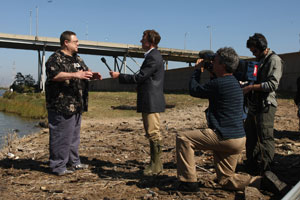New Orleans on My Mind

In my world, the build-up and anticipation for David Simon’s crew’s new creation Treme was hypertensive, culminating with the airing of the first episode on Sunday last.
Perhaps the wider universe was preoccupied with the foibles of an errant golfer and hopefully paying some attention as the Catholic Church attempted various Jesuitical acrobatics to distance itself and the so-called Holy Father from the depredations of various shepherds (I, for one, look forward to the imbroglio that will accompany the intended arrest of the Pope prompted by the relentless and righteous anger of Christopher Hitchens and Richard Dawkins). Ah, but I digress…
David Simon and a host of very talented filmmakers are, of course, responsible for the creation of one of the greatest epics of filmic narrative in the annals of that desert known as American television, The Wire, which HBO exhibited for five seasons. The avid adoration, coupled with the ability of the show’s fans to articulate the reasons for their ardent devotion, represents a triumph of excellence (the recent airing of The People Speak offers another reason to feel hopeful in these dark times when the cultural and media landscape is festooned with bellicose know-nothings and carnie barkers).
Anyway, where The Wire grabbed from the get-go (with a white homicide detective talking with a black housing-project kid), the three episodes of Treme (thanks, HBO) I have watched enveloped me in a kind of comfortable preternatural alertness—if you know what I mean. And already, in the first episode, I have found a character that looks to be as fascinating (albeit in a non-lethal way) as TheWire’s Omar (for the uninitiated, you have something to look forward to if you are convinced by suggestions that TheWire fits the definition of must-see).
If you have missed the build-up for Treme I am surprised you have found your way to this. The story is set in New Orleans’s lower Ninth Ward three months after the disaster and debacle known as Katrina in an area called Treme by its residents and the area’s cognoscenti. As in Tom Piazza’s impassioned novel City of Refuge (Piazza is also a writer on the Treme crew), we are given a bird’s eye and on-the-ground view of Katrina’s aftermath. The show opens with some Treme residents participating in the New Orleans trademark ritual known as “the second line.”
As New Orleans was much on my mind this weekend, I attempted to recall the stories with which I am familiar that are set in the so-called Big Easy (also known for reasons unknown as the City Care Forgot). The best I could come up with was Piazza’s above-mentioned opus, Robert Stone’s Hall of Mirrors, a few Richard Ford stories, Robert Stone’s vivid report on the Republican convention in the ‘80s, James Lee Burke’s Dave Robicheaux novels, Julie Smith’s crime stories of which I am slightly familiar (with the Axeman title), Tim Gautreaux’s The Missing,and Amanda Boyden’s Babylon Rolling.
I was moved communicate with my man in New Orleans, the aforementioned Tom Piazza, who took time out to help:
The Moviegoer,A Confederacy of Dunces
Glass HouseThe House On Coliseum StreetLives Of The Saints
French Quarter Fiction
Stay tuned, the dogs bark and the caravan rolls on…
